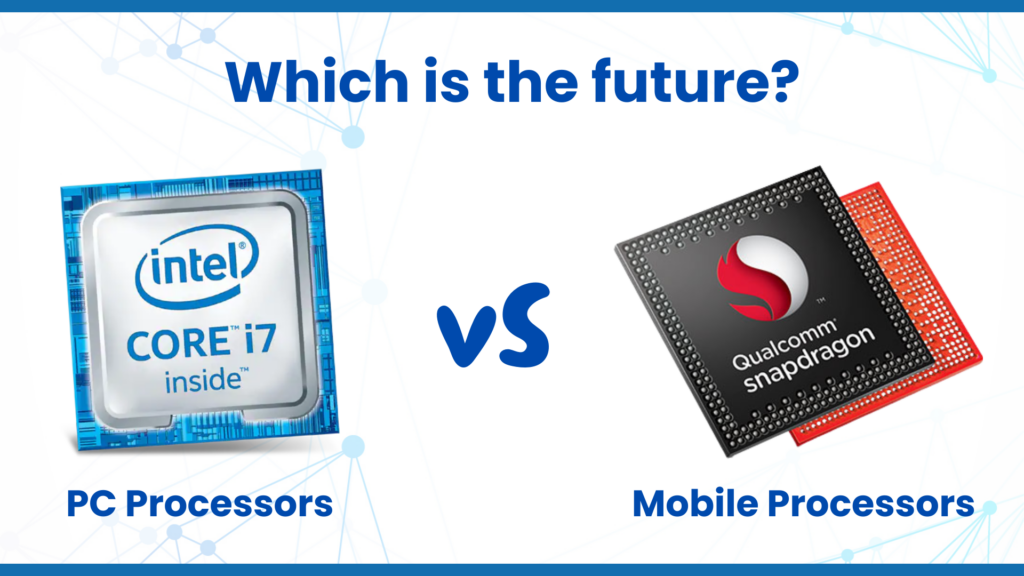Introduction
The lines between mobile and desktop computing are blurring. Traditionally, laptops and desktops have relied on powerful, but energy-hungry processors to handle demanding tasks. However, recent advancements in mobile processors are poised to revolutionize the computing landscape. These compact, efficient, and increasingly powerful chips are set to bring significant changes to laptops and desktops, offering a blend of performance, efficiency, and portability that was once unimaginable.

The Rise of Mobile Processors
Mobile processors, initially designed for smartphones and tablets, have evolved rapidly over the past decade. Companies like Apple, Qualcomm, and Samsung have pushed the boundaries of what’s possible in a small form factor, creating processors that rival, and in some cases exceed, the capabilities of traditional desktop CPUs. Apple’s M1 and M2 chips, for example, have already demonstrated how mobile processors can deliver exceptional performance in laptops.
Advantages of Mobile Processors in Laptops and Desktops
1. Energy Efficiency
One of the most significant advantages of mobile processors is their energy efficiency. Designed to maximize battery life in smartphones, these processors consume less power while delivering impressive performance. When integrated into laptops and desktops, this efficiency translates to longer battery life for laptops and reduced energy consumption for desktops. Users can enjoy extended usage times and lower electricity bills, contributing to a more sustainable computing experience.
2. Compact and Lightweight Designs
Mobile processors enable the creation of thinner, lighter, and more portable laptops and desktops. With their smaller size and lower thermal output, manufacturers can design devices that are more compact without sacrificing performance. This means ultra-portable laptops that are easy to carry around and sleek desktops that take up less space, offering greater flexibility for users.
3. Performance and Multitasking
Modern mobile processors are designed with multiple cores and advanced architectures that support high levels of multitasking and performance. With technologies like ARM architecture and integrated AI capabilities, these processors can handle complex tasks such as video editing, 3D rendering, and gaming with ease. Users can expect smoother performance, faster load times, and the ability to run multiple applications simultaneously without lag.
4. Seamless Integration with Mobile Ecosystems
As mobile processors become more prevalent in laptops and desktops, users will benefit from seamless integration with their mobile devices. Features like instant synchronization, shared applications, and cross-platform functionality will become more common, creating a unified and cohesive user experience. This integration can simplify workflows, enhance productivity, and offer new possibilities for collaboration and connectivity.
Potential Challenges and Considerations
1. Software Compatibility
One of the challenges of transitioning to mobile processors in laptops and desktops is ensuring software compatibility. While many applications are being optimized for ARM architecture and other mobile processor technologies, some legacy software may require updates or emulation to function correctly. However, as more developers embrace these processors, compatibility issues are expected to diminish over time.
2. Performance Expectations
While mobile processors are becoming increasingly powerful, they may not yet match the peak performance of the highest-end desktop CPUs in certain specialized tasks. Users with specific needs, such as high-end gaming or intensive scientific computations, may still prefer traditional desktop processors. However, for most everyday computing tasks, mobile processors are more than capable of delivering exceptional performance.
3. Transition Costs
Switching from traditional desktop processors to mobile processors can involve significant costs for both consumers and manufacturers. For consumers, this might mean investing in new hardware and potentially new software licenses if their existing applications are not compatible. For manufacturers, retooling production lines and investing in research and development for new designs can be costly. These expenses could initially be passed on to consumers, potentially making early adoption more expensive.
4. Thermal Management
Mobile processors, while more energy-efficient, still generate heat, especially under heavy workloads. Efficient thermal management in compact laptops and desktops is crucial to prevent overheating and ensure consistent performance. Designing effective cooling solutions without compromising the slim and portable nature of these devices can be challenging and might require innovative approaches to heat dissipation.
5. Battery Life Trade-offs
While mobile processors are designed to be energy-efficient, integrating them into laptops may still present challenges in balancing performance and battery life. High-performance tasks can drain the battery quickly, and manufacturers need to find the right balance to ensure users get the best of both worlds—performance and longevity. This might involve optimizing power management features and battery technologies to keep up with the increased demands.
The Future of Computing
The integration of mobile processors into laptops and desktops represents a significant shift in the computing paradigm. As these processors continue to evolve, we can expect even greater improvements in performance, efficiency, and versatility. The future of computing will likely feature devices that are more powerful, energy-efficient, and interconnected than ever before, bridging the gap between mobile and desktop experiences.
As an IT infrastructure services and solutions partner, Vertex is at the forefront of this technological evolution. We provide the latest end-point devices equipped with cutting-edge mobile processors to help businesses upgrade their IT infrastructure, ensuring better work efficiency and seamless integration with the latest technologies.
Conclusion
The integration of mobile processors into laptops and desktops promises numerous benefits, including improved performance, energy efficiency, and seamless integration with mobile ecosystems. As we embrace these advancements, it is crucial to address potential challenges such as software compatibility and transition costs.
Vertex is ready to help businesses evolve with this rapidly changing landscape, providing the latest end-point devices. Choose Vertex to upgrade your IT infrastructure and work fluently with the latest evolving tech. Let Vertex be your partner in this exciting journey.